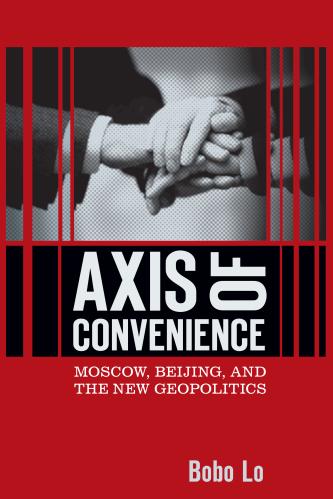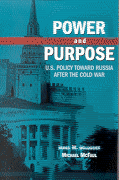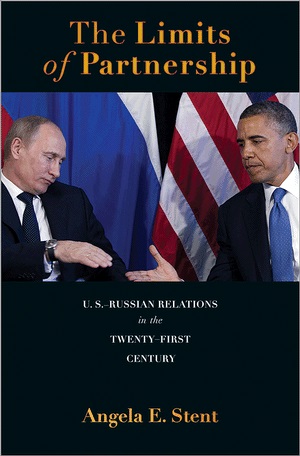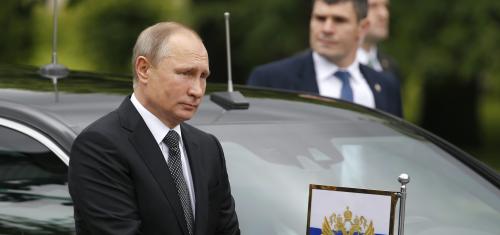To the chagrin of those who see Russia as a top national security threat to the United States—not to mention a bad apple in world affairs,—President-elect Donald Trump seems interested in making a deal with Russian President Vladimir Putin. The appeal is understandable, in a way: tensions between the two great powers are at an all-time high since the Cold War, due in particular to disagreements over Syria and Ukraine.
While it’s possible to outline the basic contours of a possible U.S.-Russia deal over Syria or Ukraine, the wisdom (not to mention plausibility) of those deals is much less obvious, and the source of considerable debate.
It’s arguably helpful that Trump will be entering the Oval Office without much direct baggage (some might say experience) in world affairs, nor a personal history with Putin. But Putin is a shrewd negotiator with a unique set of personal traits. Reaching a deal with Putin would require that Trump, above all, act pragmatically and not ideologically. What does Trump need to know about Putin in order to pull it off?
The outer edges of a deal
Russia’s interests in Syria are well understood: it wants to a) keep President Bashar Assad in power, in order to b) maintain in Syria a regime that is friendly to Russia (that is, allows Russia to keep military bases in Syria and buys Russian weapons).
While Washington’s preference is that Assad not remain in power, Trump may believe that there isn’t a clear alternative at this point, since the Syrian opposition has not been able to unify or put forward a single leader. The Trump administration may be more amenable to the Russian view in Syria— balancing it, for example, with supporting the creation of a more flexible form of the Syrian state (involving federalism, or perhaps a Lebanon-esque consociational system, with representation from different ethnic and religious groups). In three or four years, the logic goes, Assad could be replaced by a less odious leader. The approach no doubt has its share of thorns, including most obviously the troubling implications of supporting Assad after he waged a brutal war on his people for, now, five years.
The skeleton of a deal over Ukraine is also imaginable: Russia withdraws from Donbas and ends its hybrid war against Ukraine in exchange for the removal of U.S. sanctions on Russia. Such a deal would also come with a lot of thorns: Would the deal require that Washington guarantee Russia that Ukraine would not be admitted into NATO? Would Russia demand that the United States repeal the Magnitsky Act, imposing human rights-related sanctions on Russian officials? What reciprocal action would Russia take? Would arms control talks play a role?
Who is Mr. Putin?
It’s not easy to negotiate with Putin. He is maniacally suspicious of any information coming from people he does not trust, and he only trusts a handful of sources of information (SVR, Russia’s external intelligence agency; FSB, state security; and FSO, the Russian Secret Service). As a result, Putin’s negotiating partners have, as a practical matter, no stable channels of communication for everyday dialogue. Consequently, a negotiated deal between the United States and Russia would require the direct involvement of the two presidents.
Even if Putin really wants to make a deal, he has a number of qualities that make him a difficult partner. Two of them are widely-known: he respects strength and tends to hold a zero-sum outlook about negotiation. But there is much more to Mr. Putin.
Before becoming a national political leader, Putin was not a spy, per se, but rather a recruiter. It was his task as a KGB officer to establish trusting relationships with potential agents. At times, he has applied this skill well in world affairs—recall how easily he “recruited,” one by one, Western leaders during his early years in power. With his keen ability to understand others, Putin will thoroughly examine Trump’s habits and psychological characteristics; before they ever meet, Putin will have a good understanding of what keys to play.
Another important element of negotiating with Putin has to do with understanding room for interpretation. His worldview is firmly set, and he interprets the meaning of what others say and do (and agree to) within that framework. The same words may carry different meanings for him and for the person with whom he communicates, so if the exact nature of an agreement is not recorded in writing, it leaves a wide space for their interpretation and misunderstanding.
Moreover, Putin’s long experience as head of state plays a role in how he negotiates. After 17 years in power, he has spent hundreds of hours in negotiations with many politicians. He has an excellent memory, and stores a wealth of information about what he has discussed, with whom, what the points of departure were, and more. But due to limitations on his sources of information, real facts in his memory are strangely mixed with fiction, distortion, or misinterpretation.
Last but not least, Putin’s favorite sport is judo, and that is well-reflected in his character and behavior. He does not like the complex strategic planning required for chess, but is talented at planning and executing instant, tactical shots that play off his opponent’s movements. He knows how to be patient, waiting out and withstanding his opponent’s pressure in order to respond at the right moment. In a negotiation, he won’t sign a deal until he’s sure that he got what he wanted.
It is, in my view, no doubt a good thing that two presidents are ready to look for a compromise. The United States and Russia both have an interest in reducing tensions in their relations, and President-elect Trump seems willing to take proactive steps in that direction. Can they make a deal that both perceive as a victory? Although the contours of potential transactions over Syria or Ukraine are identifiable, it will be extremely difficult to fix their terms and conditions (not to mention achieve clarity and incorporate any deal into a broader balance of interests).
Putin has his own set of deep-seated characteristics and quirks that make him a tricky negotiating partner. Trump no doubt has his own, too, making it doubly-difficult to understand how their negotiating dynamics might play out. In order to sign a deal, it would seem that both would need to make some behavioral changes. That wouldn’t be easy, but it’s the only way a deal could happen.









Commentary
Vladimir, let’s make a deal
December 26, 2016